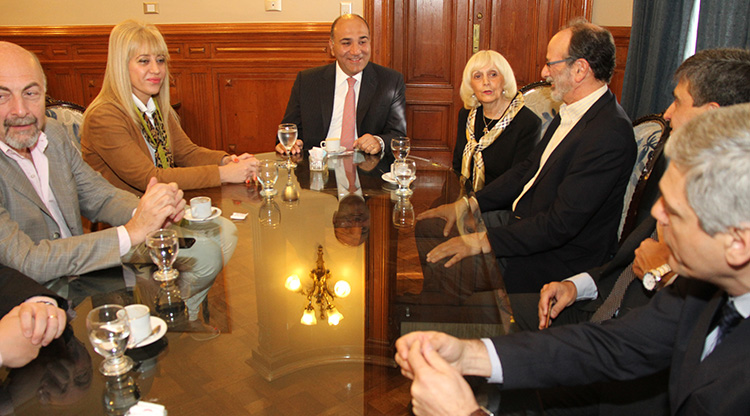This short (5 min) video is the first in a series From Research To Reward by the National Academy of Sciences about the human side of the benefits from science. It mostly follows a married, incompatible pair through their kidney exchange transplants, as part of a chain organized by the Alliance for Paired Donation (APD). The Matchmaker: An Economist Tackles Kidney Exchange from The National Academies on Vimeo.
"When Fielding Daniel and his wife Amy discovered that it would take five years for him to to be matched with a kidney donor, they were devastated. They launched a desperate search for a life-saving solution that led them to an unexpected savior - a market economist [then] at Harvard University.
"When Fielding Daniel and his wife Amy discovered that it would take five years for him to to be matched with a kidney donor, they were devastated. They launched a desperate search for a life-saving solution that led them to an unexpected savior - a market economist [then] at Harvard University.
Learn more at www.nasonline.org/r2r.
xx
xx
xx
"This short film is the first in the series From Research To Reward which examines the impact of social science research on our lives. It was created by Redglass Pictures for The National Academy of Sciences.
"A film by Sarah Klein and Tom Mason
Director of Photography Jon Kasbe
Music by Ryan Sayward Whittier
Motion Graphics by Kathleen Chee
Special thanks to: Dr. Alvin Roth. Amy and Fielding Daniel, Nobel Media, Dr. Michael Rees"
********************
The video has an animated artist's impression of the 2004 paper "Kidney Exchange" by Roth, Sonmez and Unver in the Quarterly Journal of Economics.
It also has a shout out to Susan Rees, the transplant coordinator at the APD. I've written before about the importance of the nurses and social workers who act as transplant coordinators.
You can also link to the video at
http://www.redglasspictures.com/the-matchmaker-1/
http://www.theatlantic.com/video/index/509054/harvard-economist-redesigned-kidney-marketplace/
https://www.youtube.com/watch?v=TJio37Fo0BQ
http://www.nasonline.org/publications/from-research-to-reward/
That last link also has a previously published companion story that I blogged about earlier:
ABOUT SCIENTIFIC DISCOVERY AND HUMAN BENEFIT
Matching Kidney Donors with Those Who Need Them—and Other Explorations in Economics
The chain in which the Daniels participated was featured on the front page of the December 25, 2011 issue of Parade magazine and was started by non-directed donor Deb Shearer.
Here's that story: The Miracle of Life: How One Woman Turned Tragedy into the Ultimate Gift
For kidney exchange history buffs, here's my 2009 post about of the first, pioneering non-simultaneous kidney exchange chain, organized by Dr Mike Rees, who founded the APD: the original paper is here, in the NEJM: Rees, Michael A., Jonathan E. Kopke, Ronald P. Pelletier, Dorry L. Segev, Matthew E. Rutter, Alfredo J. Fabrega, Jeffrey Rogers, Oleh G. Pankewycz, Janet Hiller, Alvin E. Roth, Tuomas Sandholm, Utku Ünver, and Robert A. Montgomery, “A Non-Simultaneous Extended Altruistic Donor Chain,” New England Journal of Medicine, 360;11, March 12, 2009
"This short film is the first in the series From Research To Reward which examines the impact of social science research on our lives. It was created by Redglass Pictures for The National Academy of Sciences.
"A film by Sarah Klein and Tom Mason
Director of Photography Jon Kasbe
Music by Ryan Sayward Whittier
Motion Graphics by Kathleen Chee
Special thanks to: Dr. Alvin Roth. Amy and Fielding Daniel, Nobel Media, Dr. Michael Rees"
The Matchmaker: An Economist Tackles Kidney Exchange from The National Academies on Vimeo.
********************
The video has an animated artist's impression of the 2004 paper "Kidney Exchange" by Roth, Sonmez and Unver in the Quarterly Journal of Economics.
It also has a shout out to Susan Rees, the transplant coordinator at the APD. I've written before about the importance of the nurses and social workers who act as transplant coordinators.
You can also link to the video at
http://www.redglasspictures.com/the-matchmaker-1/
http://www.theatlantic.com/video/index/509054/harvard-economist-redesigned-kidney-marketplace/
https://www.youtube.com/watch?v=TJio37Fo0BQ
http://www.nasonline.org/publications/from-research-to-reward/
That last link also has a previously published companion story that I blogged about earlier:
The Matchmaker: An Economist Tackles Kidney Exchange from The National Academies on Vimeo.
A NATIONAL ACADEMY OF SCIENCES SERIESABOUT SCIENTIFIC DISCOVERY AND HUMAN BENEFIT
Matching Kidney Donors with Those Who Need Them—and Other Explorations in Economics
The chain in which the Daniels participated was featured on the front page of the December 25, 2011 issue of Parade magazine and was started by non-directed donor Deb Shearer.
Here's that story: The Miracle of Life: How One Woman Turned Tragedy into the Ultimate Gift
For kidney exchange history buffs, here's my 2009 post about of the first, pioneering non-simultaneous kidney exchange chain, organized by Dr Mike Rees, who founded the APD: the original paper is here, in the NEJM: Rees, Michael A., Jonathan E. Kopke, Ronald P. Pelletier, Dorry L. Segev, Matthew E. Rutter, Alfredo J. Fabrega, Jeffrey Rogers, Oleh G. Pankewycz, Janet Hiller, Alvin E. Roth, Tuomas Sandholm, Utku Ünver, and Robert A. Montgomery, “A Non-Simultaneous Extended Altruistic Donor Chain,” New England Journal of Medicine, 360;11, March 12, 2009






